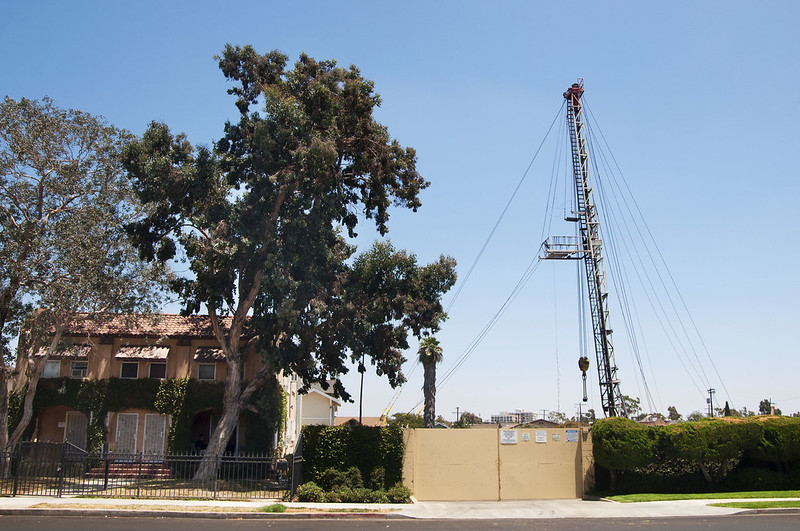California Legislators Call for More Stringent Requirements for Oil and Gas
Students in UCLA’s California Environmental Legislation and Policy Clinic partner with State Senator Sydney Kamlager to draft letter to CalGEM on proposed public health rule

This post is co-authored by Julia Stein and Beth Kent.
Neighborhood oil and gas extraction poses serious public health and environmental risks to communities across California – and campaigns by local advocates and political leaders over the last decade have pressed state agencies and local governments, including the City of Los Angeles and Los Angeles County, to better protect those at risk. While some local governments are stepping up to address these risks, advocates believe statewide policy initiatives will be crucial to adequately address the challenges.
In October 2021, the California Geologic Energy Management Division (CalGEM), the state agency responsible for regulating oil and gas activities, released a draft rule proposing a 3,200-foot setback between new oil and gas wells and facilities and homes, schools, hospitals, nursing homes, and other sensitive locations. The rule would also require pollution controls for existing operations within the setback area. If adopted as is, the rule would significantly limit new oil and gas activities throughout the state, while providing some protections for communities living near existing wells. These are important first steps, but the rule does not go far enough to protect communities currently living near active oil and gas facilities.
Students and faculty in the California Environmental Legislation and Policy Clinic worked with Senator Sydney Kamlager and 17 state legislators on a comment letter that was based on an internal review of the draft rule, as well as conversations with representatives of nonprofit environmental and community-based organizations. Senator Kamlager represents California’s 30th District, which includes Culver City and portions of the City of Los Angeles that have been centers for neighborhood oil drilling for decades.
The letter argues that while the draft rule is an important step toward protecting communities from the harmful impacts of neighborhood oil and gas extraction, the rule does not go far enough. Chiefly, the rule’s requirements for existing operations will not provide sufficient protections for the more than two million Californians currently experiencing asthma, reduced lung function, poor birth outcomes, and other adverse health outcomes caused by the proximity of oil and gas production sites.
To better protect communities, the letter encourages CalGEM to strengthen the rule by:
- Applying setback requirements to existing wells;
- Closing loopholes for re-drilling, reworking, and other continued extractive activity within the setback area;
- Applying the rule’s engineering control requirements to all wells, including wells outside the setback area from the; and
- Incorporating a discussion about or planning for the long-term phase-out of production activities.
The recommendations made in the letter are consistent with the findings of the California Oil and Gas Public Health Rulemaking Scientific Advisory Panel (the “Panel”), a panel of medical and public health experts empaneled by CalGEM and charged with reviewing the impacts of oil and gas production to inform this rulemaking. CalGEM consulted the Panel in developing its draft rule, and the panel was clear in its findings: Close proximity to oil and gas development causes significant adverse health effects, including poor birth outcomes, asthma, and reduced lung function. The Panel emphasized that “neither setbacks nor engineering controls alone are sufficient to reduce the health hazards and risks [from oil and gas production]…both approaches are needed in tandem.” The current rule requires only engineering controls for all existing oil and gas operations, and thus leaves millions of Californians vulnerable to long-term health impacts from continued exposure to oil and gas pollutants.
Community activists have been at the heart of the push for more protections against the harmful effects of neighborhood oil and gas extraction. Statewide efforts to end extraction activities have been led by the VISIÓN Coalition, which includes Sacred Places Institute for Indigenous Peoples, the Center on Race, Poverty and the Environment, Central Valley Air Quality Coalition, Physicians for Social Responsibility Los Angeles, the Central California Environmental Justice Network, Communities for a Better Environment, Central California Asthma Collaborative, and California Environmental Justice Alliance Action. VISIÓN represents low-income communities of color throughout the state who are fighting for clean air and healthy neighborhoods. In the last several years, VISIÓN sponsored legislation to create a statewide setback, including AB 345 (2019), which did not pass, but helped generate public awareness of this issue.
CalGEM is currently in the process of reviewing over 80,000 public comments on the draft rule. It is also conducting additional stakeholder research and developing a Standardized Regulatory Impact Assessment of the rule’s costs and benefits. The expected product of this process will be a revised rule and supporting statement of reasons. This process could take over a year, which is one of the reasons it is critical to ensure the rule provides adequate regulations for both existing and new oil and gas wells and facilities.
A special thanks to UCLA California Environmental Legislation and Policy Clinic students Kimaya Abreu, Matthew Ramirez, and Alton Wang for their work on this letter.
Reader Comments
One Reply to “California Legislators Call for More Stringent Requirements for Oil and Gas”
Comments are closed.





Do you have any access to laws pertaining to refusing to have a smart meter I live in Minnesota and have a coop as our electrical provider